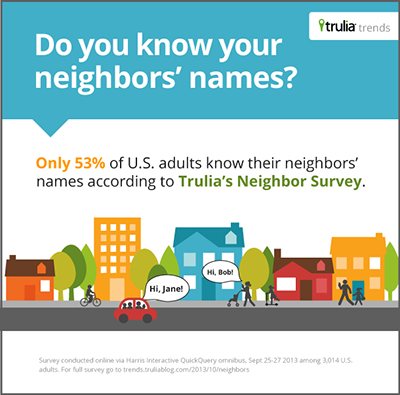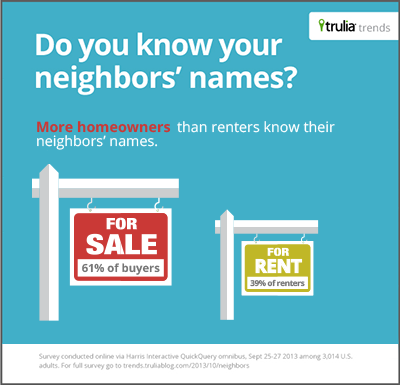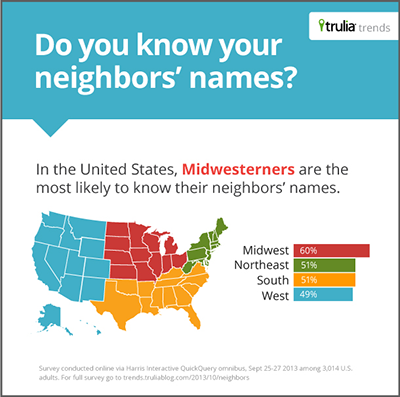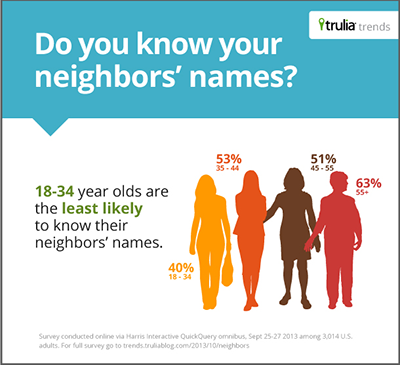Do Americans love their neighbors as themselves? Although “love” might be pushing it, most Americans are pretty happy with their neighbors. To understand how Americans feel about their neighbors, Trulia surveyed 3,014 American adults on September 25-27, 2013.
Hey-Diddly-Ho, Neighborino!
Let’s start with the good news. Unlike Homer Simpson, who lives next door to the annoying Ned Flanders, two thirds of all Americans like their neighbors, and that number jumps to 80% among people who know their neighbors’ names. But even among people who don’t know their neighbors’ names, 53% like their neighbors.

Does renting versus owning make a difference? You bet. Homeowners are much more likely than renters are to like their neighbors (74% for owners, 58% for renters) and to know their neighbors’ names (61% for owners, 39% for renters).

How about geography? Looking across regions, Midwesterners are most likely to know their neighbors’ names: 60% do, compared with 51% in the Northeast and the South, and 49% in the West. But perhaps Westerners are easier-going, since they’re the most likely to like their neighbors (72% in the West vs. 67% nationally), despite being the least likely to know their names. More suburbanites, too, like their neighbors and know their names than people who live in more urban areas.

| % who generally like their neighbors | % who know their neighbors’ names | |
| Owners | 74% | 61% |
| Renters | 58% | 39% |
| Northeast | 67% | 51% |
| Midwest | 67% | 60% |
| South | 65% | 51% |
| West | 72% | 49% |
| Urban | 65% | 46% |
| Suburban | 68% | 54% |

Very few people – just 5% – say they dislike their neighbors, and only 5% are thinking about moving away because of them. If a disagreement arose with a neighbor, 61% would try to fix the conflict by getting to know their neighbor better and patching up the relationship, while only 4% would get into a fight or argument.
All in all, Americans should consider themselves lucky to have such good neighborly relationships. Most didn’t plan it that way: in fact, few people considered their prospective neighbors as a “very important” factor when they chose their current home. The cost and condition of the home, as well as the location of the neighborhood, were far more important considerations.
Few People Said Neighbors Were “Very Important” in Choosing Homes
| Consideration When Choosing Current Home | % “very important” |
| Cost of home | 57% |
| Condition of home | 54% |
| Location of neighborhood | 46% |
| Character of neighborhood | 37% |
| Size of home | 30% |
| Neighbors | 16% |
Despite neighbors taking a back seat compared with other considerations when choosing a home, harmony reigns in neighborhoods across America.
Won’t You Be My Neighbor?
Even though the majority of Americans like their neighbors, most are picky: 75% prefer that their neighbors have particular traits, characteristics, or behaviors. Among all respondents (not just those with preferences), 35% said it was important to them that their neighbors are homeowners, including 51% of respondents who were homeowners themselves.
More than race, age, education, politics, and religion, one in three (33%) Americans said it was important that they and their neighbors speak the same language. Among the respondents who really care who their neighbors are – that is, those that said that the neighbors were a very important consideration when choosing their home – 40% want neighbors who speak the same language. Even though only 10% of respondents said it was important that neighbors are of the same race or ethnicity as they are, language was important – and language differences often go hand in hand with racial or ethnic differences.
| “It is important to me that my neighbors…” | All respondents | Respondents who say neighbors “very important” in choosing current home | Suburban respondents | Urban respondents |
| Are homeowners | 35% | 39% | 38% | 29% |
| Speak the same language as me | 33% | 40% | 34% | 27% |
| Are as involved with our neighborhood as I am | 22% | 31% | 22% | 24% |
| Have lived in our neighborhood a long time | 22% | 31% | 22% | 23% |
| Have the same family structure as me | 16% | 25% | 17% | 13% |
| Keep the same hours as I do | 13% | 17% | 12% | 15% |
| Are of the same race or ethnicity as me | 10% | 17% | 11% | 8% |
| Are the same age as me | 9% | 12% | 8% | 10% |
| Have children of the same ages as mine | 8% | 14% | 8% | 9% |
| Have the same education level as me | 7% | 11% | 6% | 8% |
| Have the same political views as me | 4% | 5% | 3% | 5% |
| Practice the same religion as me | 3% | 6% | 3% | 2% |
Overall, suburbanites are pickier about their neighbors than urban dwellers, even though the urbanites live closer to their neighbors. Suburbanites were more likely than urbanites to want neighbors who are homeowners (38% for suburbanites vs. 29% for urbanites) and who speak the same language (34% vs. 27%). It’s also more important for suburbanites to have neighbors who have a similar family structure (like married, having kids, etc.), race or ethnicity, and religion. Urbanites, however, were more likely than suburbanites to want neighbors who keep the same hours, have same education level, and have same political views. (All of the differences called out in this paragraph are statistically significant at the 10% level.)
Furthermore, urbanites yearn for a greater sense of community. The number one thing people wish their neighborhood had more of is local restaurants. But the second most popular wish in urban areas is for a stronger sense of community, which 26% of urban dwellers want, compared with only 20% of suburbanites.
| “I wish my neighborhood had more …” | All | Suburban | Urban |
| Local restaurants | 27% | 26% | 29% |
| Local grocery shopping options | 22% | 22% | 22% |
| Sense of community | 22% | 20% | 26% |
| Parks | 21% | 21% | 23% |
| Peace and quiet | 20% | 19% | 23% |
| Public transportation options | 18% | 19% | 17% |
| Local commercial shopping options | 17% | 17% | 18% |
| Local coffee shops | 16% | 14% | 21% |
| Block parties | 15% | 16% | 16% |
| Police presence | 15% | 13% | 19% |
| Community pools | 14% | 14% | 14% |
| Private security guards/Neighborhood watch members | 11% | 10% | 14% |
| Families with children | 9% | 9% | 10% |
| Highway access options | 6% | 6% | 7% |
There Goes the Neighborhood
Although most people like their neighbors – which means most of your neighbors probably like you – you should probably stay on guard. Some neighbors, even the friendly ones, can be judgmental, passive-aggressive, or be a little on the nosy side.
One fifth of Americans say they judge their neighbors based on the appearance or condition of their home or property. But passive-aggressive neighbors are more common than judgy neighbors: 31% would actively ignore a neighbor they were in a disagreement with, and 30% would complain to a higher authority. Finally, some neighbors get awfully curious when a neighbor’s home goes up for sale: 27% check out the home online, and 11% attend the open house.
| Statement | % choosing or agreeing with statement |
| If I were in a disagreement with a neighbor, I would actively ignore them | 31% |
| If I were in a disagreement with a neighbor, I would complain to landlord, homeowners’ association, police, or other local authority | 30% |
| When a home goes up for sale in my neighborhood, I check out the home on an online real estate site | 27% |
| I judge my neighbors on the appearance or condition of their home or property | 20% |
| When a home goes up for sale in my neighborhood, I attend the open house | 11% |
Still, most Americans like their neighbors – despite the fact most would prefer that their neighbors are homeowners, speak the same language, or have other traits similar to themselves – even if they don’t know their names. And although few people say that their prospective neighbors were a very important consideration when they chose their current home, most end up liking their neighbors after all.
METHODOLOGY
This survey was conducted online within the United States by Harris Interactive on behalf of Trulia from September 25-27, 2013 among 3,014 adults ages 18 and older. This online survey is not based on a probability sample and therefore no estimate of theoretical sampling error can be calculated. For complete survey methodology, including weighting variables, please contact pr@trulia.com.
To compare “city” versus “suburb,” we classify neighborhoods as either urban or suburban based on how dense or spread out the housing is. We define urban neighborhoods as those where a majority of the housing is apartments, attached townhouses, or other multi-unit buildings; suburban neighborhoods are those where a majority of the housing is single-family detached houses. We used this methodology rather than simply identifying the biggest city in a metro as “urban” and treating the rest of the metro as the “suburbs,” as other reports on cities-versus-suburbs often do. The problem with using city boundaries is that many neighborhoods outside of the biggest city are actually much more urban than some neighborhoods within a city’s boundary. For instance, our definition classifies Hoboken, NJ, Central Square in Cambridge, MA, and Santa Monica – which are all very dense – as urban neighborhoods, even though they’re outside the city boundaries of New York, Boston, and Los Angeles, respectively.

